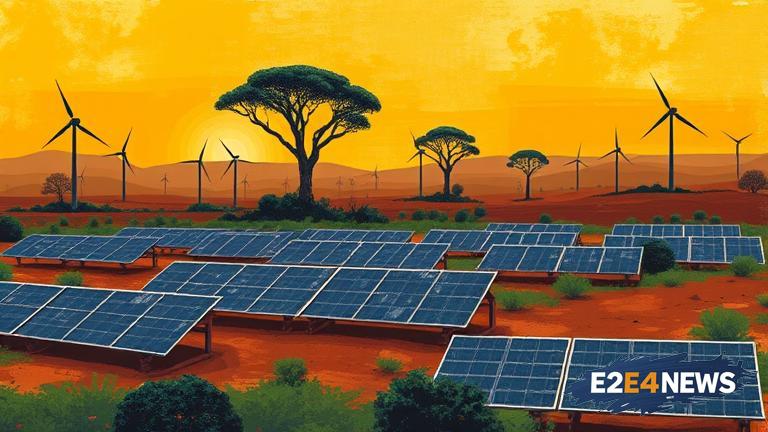Africa is undergoing a significant transformation in its energy landscape, with a growing focus on renewable energy sources. The continent is rich in solar and wind resources, making it an ideal location for the development of renewable energy projects. In recent years, there has been a surge in investment in the renewable energy sector, with many countries committing to increase their use of clean energy. South Africa, for example, has set a target of generating 20% of its electricity from renewable sources by 2030. The country has already made significant progress in this regard, with the development of several large-scale solar and wind farms. Other countries, such as Morocco and Egypt, are also investing heavily in renewable energy, with a focus on solar and wind power. The use of renewable energy is not only beneficial for the environment, but it also has the potential to create jobs and stimulate economic growth. In fact, a report by the International Renewable Energy Agency (IRENA) found that the renewable energy sector could support up to 24 million jobs globally by 2030. Africa is well-positioned to take advantage of this trend, with many countries having an abundance of renewable energy resources. The development of renewable energy projects is also being driven by the need to address energy poverty, with many communities in Africa lacking access to reliable and affordable energy. Renewable energy can help to address this issue, by providing energy to off-grid communities and reducing reliance on fossil fuels. Furthermore, the use of renewable energy can also help to reduce greenhouse gas emissions, which contribute to climate change. Africa is particularly vulnerable to the impacts of climate change, making the transition to renewable energy all the more urgent. In addition to the environmental benefits, the development of renewable energy projects can also have a positive impact on local economies. For example, the development of a wind farm can create jobs and stimulate local economic activity, while also providing a source of clean energy. The African Union has also recognized the importance of renewable energy, with the adoption of the Africa Renewable Energy Initiative (AREI). The initiative aims to develop at least 300 gigawatts of renewable energy capacity by 2030, which will help to address energy poverty and reduce greenhouse gas emissions. The development of renewable energy projects is also being supported by international organizations, such as the World Bank and the African Development Bank. These organizations are providing financing and technical assistance to support the development of renewable energy projects, which will help to drive the transition to a low-carbon economy. Overall, the shift towards renewable energy in Africa is a positive trend, which has the potential to create jobs, stimulate economic growth, and reduce greenhouse gas emissions. As the continent continues to develop and grow, it is likely that the use of renewable energy will play an increasingly important role in the energy mix. With the right policies and investments in place, Africa can unlock its vast renewable energy potential and become a leader in the global transition to a low-carbon economy. The future of energy in Africa is looking bright, with renewable energy set to play a major role in the continent’s development. In conclusion, the renewable energy revolution in Africa is gaining momentum, with solar and wind power leading the charge. The development of renewable energy projects is being driven by the need to address energy poverty, reduce greenhouse gas emissions, and create jobs and stimulate economic growth. With the support of international organizations and the adoption of policies such as the Africa Renewable Energy Initiative, Africa is well-positioned to become a leader in the global transition to a low-carbon economy.
